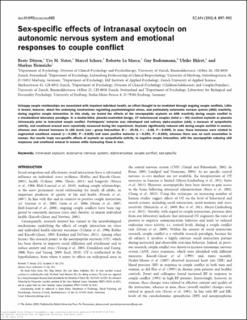Please use this identifier to cite or link to this item:
https://doi.org/10.21256/zhaw-4322Full metadata record
| DC Field | Value | Language |
|---|---|---|
| dc.contributor.author | Ditzen, Beate | - |
| dc.contributor.author | Nater, Urs M. | - |
| dc.contributor.author | Schär Gmelch, Marcel | - |
| dc.contributor.author | La Marca, Roberto | - |
| dc.contributor.author | Bodenmann, Guy | - |
| dc.contributor.author | Ehlert, Ulrike | - |
| dc.contributor.author | Heinrichs, Markus | - |
| dc.date.accessioned | 2018-06-22T11:54:34Z | - |
| dc.date.available | 2018-06-22T11:54:34Z | - |
| dc.date.issued | 2013 | - |
| dc.identifier.issn | 1749-5024 | de_CH |
| dc.identifier.issn | 1749-5016 | de_CH |
| dc.identifier.uri | https://digitalcollection.zhaw.ch/handle/11475/7211 | - |
| dc.description | Erworben im Rahmen der Schweizer Nationallizenzen (http://www.nationallizenzen.ch) | de_CH |
| dc.description.abstract | Unhappy couple relationships are associated with impaired individual health, an effect thought to be mediated through ongoing couple conflicts. Little is known, however, about the underlying mechanisms regulating psychobiological stress, and particularly autonomic nervous system (ANS) reactivity, during negative couple interaction. In this study, we tested the effects of the neuropeptide oxytocin on ANS reactivity during couple conflict in a standardized laboratory paradigm. In a double-blind, placebo-controlled design, 47 heterosexual couples (total n = 94) received oxytocin or placebo intranasally prior to instructed couple conflict. Participants’ behavior was videotaped and salivary alpha-amylase (sAA), a measure of sympathetic activity, and emotional arousal were repeatedly measured during the experiment. Oxytocin significantly reduced sAA during couple conflict in women, whereas men showed increases in sAA levels (sex × group interaction: B = −49.36, t = −2.68, P = 0.009). In men, these increases were related to augmented emotional arousal (r = 0.286, P = 0.028) and more positive behavior (r = 0.291, P = 0.026), whereas there was no such association in women. Our results imply sex-specific effects of oxytocin on sympathetic activity, to negative couple interaction, with the neuropeptide reducing sAA responses and emotional arousal in women while increasing them in men. | de_CH |
| dc.language.iso | en | de_CH |
| dc.publisher | Oxford University Press | de_CH |
| dc.relation.ispartof | Social Cognitive and Affective Neuroscience | de_CH |
| dc.rights | Licence according to publishing contract | de_CH |
| dc.subject | Oxytocin | de_CH |
| dc.subject | Stress | de_CH |
| dc.subject | Couples | de_CH |
| dc.subject | Marital Conflict | de_CH |
| dc.subject | Human Sex Differences | de_CH |
| dc.subject | Sympathetic Nervous System | de_CH |
| dc.subject | Emotional Responses | de_CH |
| dc.subject | Psychophysiology | de_CH |
| dc.subject | Group and Interpersonal Processes | de_CH |
| dc.subject | Paare | de_CH |
| dc.subject | Partnerschaftskonflikt | de_CH |
| dc.subject | Geschlechtsunterschiede beim Menschen | de_CH |
| dc.subject | Sympathisches Nervensystem | de_CH |
| dc.subject | Emotionale Reaktionen | de_CH |
| dc.subject | Psychophysiologie | de_CH |
| dc.subject | Gruppendynamik | de_CH |
| dc.subject | Interpersonelle Prozesse | de_CH |
| dc.subject.ddc | 158: Angewandte Psychologie | de_CH |
| dc.title | Sex-specific effects of intranasal oxytocin on autonomic nervous system and emotional responses to couple conflict | de_CH |
| dc.type | Beitrag in wissenschaftlicher Zeitschrift | de_CH |
| dcterms.type | Text | de_CH |
| zhaw.departement | Angewandte Psychologie | de_CH |
| zhaw.organisationalunit | Institut für Angewandte Psychologie (IAP) | de_CH |
| dc.identifier.doi | 10.21256/zhaw-4322 | - |
| dc.identifier.doi | 10.1093/scan/nss083 | de_CH |
| zhaw.funding.eu | No | de_CH |
| zhaw.issue | 8 | de_CH |
| zhaw.originated.zhaw | Yes | de_CH |
| zhaw.pages.end | 902 | de_CH |
| zhaw.pages.start | 897 | de_CH |
| zhaw.publication.status | publishedVersion | de_CH |
| zhaw.volume | 8 | de_CH |
| zhaw.publication.review | Not specified | de_CH |
| zhaw.webfeed | Diagnostik und Beratung | de_CH |
| zhaw.webfeed | Klinische Psychologie | de_CH |
| Appears in collections: | Publikationen Angewandte Psychologie | |
Files in This Item:
| File | Description | Size | Format | |
|---|---|---|---|---|
| 2013_Ditzen_Sex-specific effects of intranasal oxytocin on autonomic nervous system and emotional responses to couple conflict.pdf | 243.61 kB | Adobe PDF |  View/Open |
Show simple item record
Ditzen, B., Nater, U. M., Schär Gmelch, M., La Marca, R., Bodenmann, G., Ehlert, U., & Heinrichs, M. (2013). Sex-specific effects of intranasal oxytocin on autonomic nervous system and emotional responses to couple conflict. Social Cognitive and Affective Neuroscience, 8(8), 897–902. https://doi.org/10.21256/zhaw-4322
Ditzen, B. et al. (2013) ‘Sex-specific effects of intranasal oxytocin on autonomic nervous system and emotional responses to couple conflict’, Social Cognitive and Affective Neuroscience, 8(8), pp. 897–902. Available at: https://doi.org/10.21256/zhaw-4322.
B. Ditzen et al., “Sex-specific effects of intranasal oxytocin on autonomic nervous system and emotional responses to couple conflict,” Social Cognitive and Affective Neuroscience, vol. 8, no. 8, pp. 897–902, 2013, doi: 10.21256/zhaw-4322.
DITZEN, Beate, Urs M. NATER, Marcel SCHÄR GMELCH, Roberto LA MARCA, Guy BODENMANN, Ulrike EHLERT und Markus HEINRICHS, 2013. Sex-specific effects of intranasal oxytocin on autonomic nervous system and emotional responses to couple conflict. Social Cognitive and Affective Neuroscience. 2013. Bd. 8, Nr. 8, S. 897–902. DOI 10.21256/zhaw-4322
Ditzen, Beate, Urs M. Nater, Marcel Schär Gmelch, Roberto La Marca, Guy Bodenmann, Ulrike Ehlert, and Markus Heinrichs. 2013. “Sex-Specific Effects of Intranasal Oxytocin on Autonomic Nervous System and Emotional Responses to Couple Conflict.” Social Cognitive and Affective Neuroscience 8 (8): 897–902. https://doi.org/10.21256/zhaw-4322.
Ditzen, Beate, et al. “Sex-Specific Effects of Intranasal Oxytocin on Autonomic Nervous System and Emotional Responses to Couple Conflict.” Social Cognitive and Affective Neuroscience, vol. 8, no. 8, 2013, pp. 897–902, https://doi.org/10.21256/zhaw-4322.
Items in DSpace are protected by copyright, with all rights reserved, unless otherwise indicated.